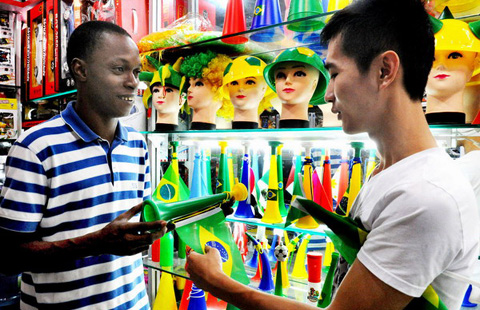Curbing 'brushing' difficult: report
Updated: 2015-04-03 23:04
By PAUL WELITZKIN in New York(China Daily USA)
|
||||||||
As China moves to curb the practice of "brushing" -- falsely boosting merchant credibility ratings on e-commerce services -- a report done by US researchers shows it's very hard to prevent such manipulation.
China's Ministry of Commerce said on Tuesday that it wants operators of retail platforms like Alibaba's Taobao to ban vendors who falsify ratings. Those platform operators could also face fines of up to 500,000 yuan ($80,000) for failing to provide relevant information about such practices, according to a draft law.
The report on e-commerce reputation manipulation was done by a research team at the College of William and Mary in Williamsburg, Virginia. It is scheduled to be published by the International World Wide Web Conference Committee next month. The study says brushing is now "…an emerging underground industry that employs sophisticated methods to cater to online sellers who want to quickly boost their online reputations," according to a Wall Street Journal article on Thursday that details the report.
Haitao Xu, a native of Henan province who is studying for a doctorate at William and Mary, is one of the authors of the report. He said the team's research shows that sellers who faked transactions were able to lift their online stores' rankings swiftly.
Xu and fellow team members monitored 11,000 sellers on Taobao. "This number is quite small considering that there are millions of sellers on Taobao," Xu told China Daily in an interview.
According to Xu, brushing works like this: vendors pay brushers the cost of the products they are ordering, plus a fee. The brushers then place an order and make a payment using that money. The vendors then ship boxes that are empty or full of worthless merchandise while the brushers write very positive reviews.
Using the actual Taobao ID of more than 4,000 sellers, Xu and his colleagues tracked how their store ratings improved. They discovered that Taobao sellers who faked transaction could basically boost their store rankings 10 times fasters.
"The major components of a seller's reputation include transaction volume and positive reviews," said Xu. He said the brushing method represents an "emerging threat" to the e-commerce reputation system. Xu's research team found that of the 4,109 sellers on Taobao identified as faking transactions, only 89 or 2.2 percent were detected by Taobao and eventually penalized.
Xu's team offered suggestions to mitigate the problem. Web hosting service providers could take down sites with brushing and operators should improve detection of account abuse.
The company maintains it doesn't condone fake transactions and that it eliminates them from its reporting on merchandise volume, which amounted to 1.68 trillion yuan for its two main shopping platforms, Taobao and Tmall, in the fiscal year ended March 2014. In 2014, China's online retail sales grew 41 percent, worth 2.6 trillion yuan, government data showed.
paulwelitzkin@chinadailyusa.com

 2015 New York International Automobile Show kicks off
2015 New York International Automobile Show kicks off
 Ancient 'Xiangshi' kicks off in Wuzhen
Ancient 'Xiangshi' kicks off in Wuzhen
 Golden moments at jewelry show
Golden moments at jewelry show
 Luoyang, the ancient capital of thirteen dynasties
Luoyang, the ancient capital of thirteen dynasties
 Across America over the week (from March 27 to April 2)
Across America over the week (from March 27 to April 2)
 Off the beaten path: China's top 'surf' breaks
Off the beaten path: China's top 'surf' breaks
 Where eagles still soar
Where eagles still soar
 Top 5 cooperation priorities in the Belt and Road Initiative
Top 5 cooperation priorities in the Belt and Road Initiative
Most Viewed
Editor's Picks

|

|

|

|

|

|
Today's Top News
Xi plants roots of
green awareness
Li backs firms' global vision
China to standardize energy conservation by 2020
More Chinese, US pilots killed in anti-Japanese invasion war identified
China checkmates US on Asia bank
Policy helps China to urbanize
Curbing 'brushing' difficult: report
Conflict not inevitable: Joseph Nye
US Weekly

|

|






